macOS Universal binaries & Mach-O Format
[AD REMOVED]
Basic Information
Mac OS binaries usually are compiled as universal binaries. A universal binary can support multiple architectures in the same file.
These binaries follows the Mach-O structure which is basically compased of:
- Header
- Load Commands
- Data
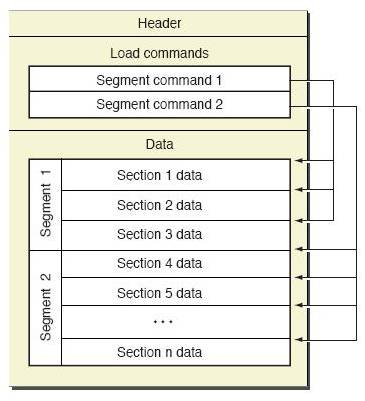
Fat Header
Search for the file with: mdfind fat.h | grep -i mach-o | grep -E "fat.h$"
#define FAT_MAGIC 0xcafebabe
#define FAT_CIGAM 0xbebafeca /* NXSwapLong(FAT_MAGIC) */
struct fat_header {
uint32_t magic; /* FAT_MAGIC or FAT_MAGIC_64 */
uint32_t nfat_arch; /* number of structs that follow */
};
struct fat_arch {
cpu_type_t cputype; /* cpu specifier (int) */
cpu_subtype_t cpusubtype; /* machine specifier (int) */
uint32_t offset; /* file offset to this object file */
uint32_t size; /* size of this object file */
uint32_t align; /* alignment as a power of 2 */
};
The header has the magic bytes followed by the number of archs the file contains (nfat_arch) and each arch will have a fat_arch struct.
Check it with:
% file /bin/ls
/bin/ls: Mach-O universal binary with 2 architectures: [x86_64:Mach-O 64-bit executable x86_64] [arm64e:Mach-O 64-bit executable arm64e]
/bin/ls (for architecture x86_64): Mach-O 64-bit executable x86_64
/bin/ls (for architecture arm64e): Mach-O 64-bit executable arm64e
% otool -f -v /bin/ls
Fat headers
fat_magic FAT_MAGIC
nfat_arch 2
architecture x86_64
cputype CPU_TYPE_X86_64
cpusubtype CPU_SUBTYPE_X86_64_ALL
capabilities 0x0
offset 16384
size 72896
align 2^14 (16384)
architecture arm64e
cputype CPU_TYPE_ARM64
cpusubtype CPU_SUBTYPE_ARM64E
capabilities PTR_AUTH_VERSION USERSPACE 0
offset 98304
size 88816
align 2^14 (16384)
or using the Mach-O View tool:
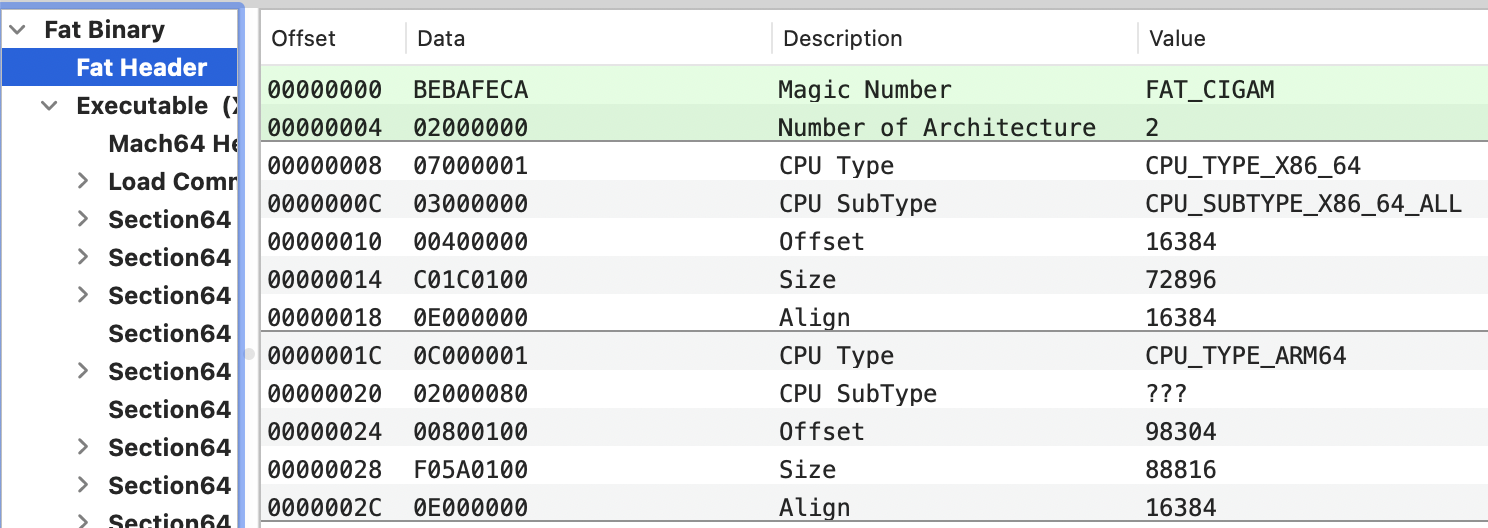
As you may be thinking usually a universal binary compiled for 2 architectures doubles the size of one compiled for just 1 arch.
Mach-O Header
The header contains basic information about the file, such as magic bytes to identify it as a Mach-O file and information about the target architecture. You can find it in: mdfind loader.h | grep -i mach-o | grep -E "loader.h$"
#define MH_MAGIC 0xfeedface /* the mach magic number */
#define MH_CIGAM 0xcefaedfe /* NXSwapInt(MH_MAGIC) */
struct mach_header {
uint32_t magic; /* mach magic number identifier */
cpu_type_t cputype; /* cpu specifier (e.g. I386) */
cpu_subtype_t cpusubtype; /* machine specifier */
uint32_t filetype; /* type of file (usage and alignment for the file) */
uint32_t ncmds; /* number of load commands */
uint32_t sizeofcmds; /* the size of all the load commands */
uint32_t flags; /* flags */
};
#define MH_MAGIC_64 0xfeedfacf /* the 64-bit mach magic number */
#define MH_CIGAM_64 0xcffaedfe /* NXSwapInt(MH_MAGIC_64) */
struct mach_header_64 {
uint32_t magic; /* mach magic number identifier */
int32_t cputype; /* cpu specifier */
int32_t cpusubtype; /* machine specifier */
uint32_t filetype; /* type of file */
uint32_t ncmds; /* number of load commands */
uint32_t sizeofcmds; /* the size of all the load commands */
uint32_t flags; /* flags */
uint32_t reserved; /* reserved */
};
Mach-O File Types
There are different file types, you can find them defined in the source code for example here. The most important ones are:
MH_OBJECT: Relocatable object file (intermediate products of compilation, not executables yet).MH_EXECUTE: Executable files.MH_FVMLIB: Fixed VM library file.MH_CORE: Code DumpsMH_PRELOAD: Preloaded executable file (no longer supported in XNU)MH_DYLIB: Dynamic LibrariesMH_DYLINKER: Dynamic LinkerMH_BUNDLE: "Plugin files". Generated using -bundle in gcc and explicitly loaded byNSBundleordlopen.MH_DYSM: Companion.dSymfile (file with symbols for debugging).MH_KEXT_BUNDLE: Kernel Extensions.
# Checking the mac header of a binary
otool -arch arm64e -hv /bin/ls
Mach header
magic cputype cpusubtype caps filetype ncmds sizeofcmds flags
MH_MAGIC_64 ARM64 E USR00 EXECUTE 19 1728 NOUNDEFS DYLDLINK TWOLEVEL PIE
Or using Mach-O View:
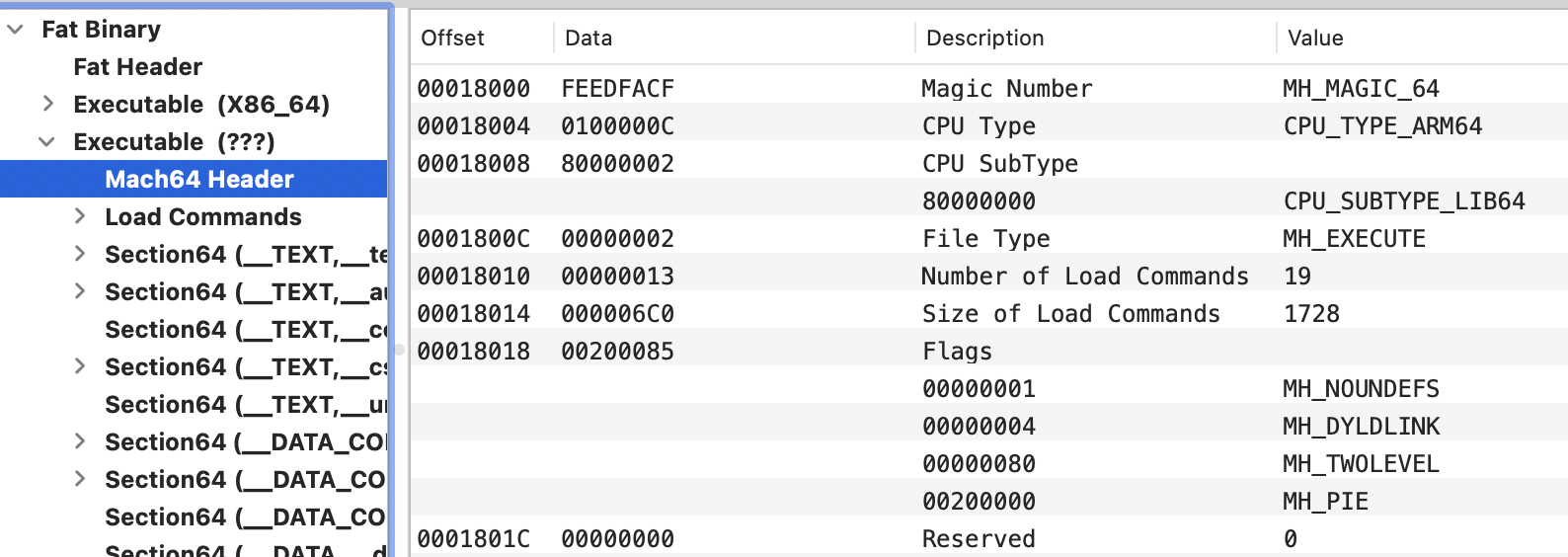
Mach-O Flags
The source code also defines several flags useful for loading libraries:
MH_NOUNDEFS: No undefined references (fully linked)MH_DYLDLINK: Dyld linkingMH_PREBOUND: Dynamic references prebound.MH_SPLIT_SEGS: File splits r/o and r/w segments.MH_WEAK_DEFINES: Binary has weak defined symbolsMH_BINDS_TO_WEAK: Binary uses weak symbolsMH_ALLOW_STACK_EXECUTION: Make the stack executableMH_NO_REEXPORTED_DYLIBS: Library not LC_REEXPORT commandsMH_PIE: Position Independent ExecutableMH_HAS_TLV_DESCRIPTORS: There is a section with thread local variablesMH_NO_HEAP_EXECUTION: No execution for heap/data pagesMH_HAS_OBJC: Binary has oBject-C sectionsMH_SIM_SUPPORT: Simulator supportMH_DYLIB_IN_CACHE: Used on dylibs/frameworks in shared library cache.
Mach-O Load commands
The file's layout in memory is specified here, detailing the symbol table's location, the context of the main thread at execution start, and the required shared libraries. Instructions are provided to the dynamic loader (dyld) on the binary's loading process into memory.
The uses the load_command structure, defined in the mentioned loader.h:
struct load_command {
uint32_t cmd; /* type of load command */
uint32_t cmdsize; /* total size of command in bytes */
};
There are about 50 different types of load commands that the system handles differently. The most common ones are: LC_SEGMENT_64, LC_LOAD_DYLINKER, LC_MAIN, LC_LOAD_DYLIB, and LC_CODE_SIGNATURE.
LC_SEGMENT/LC_SEGMENT_64
[!TIP] Basically, this type of Load Command define how to load the __TEXT (executable code) and __DATA (data for the process) segments according to the offsets indicated in the Data section when the binary is executed.
These commands define segments that are mapped into the virtual memory space of a process when it is executed.
There are different types of segments, such as the __TEXT segment, which holds the executable code of a program, and the __DATA segment, which contains data used by the process. These segments are located in the data section of the Mach-O file.
Each segment can be further divided into multiple sections. The load command structure contains information about these sections within the respective segment.
In the header first you find the segment header:
struct segment_command_64 { /* for 64-bit architectures */
uint32_t cmd; /* LC_SEGMENT_64 */
uint32_t cmdsize; /* includes sizeof section_64 structs */
char segname[16]; /* segment name */
uint64_t vmaddr; /* memory address of this segment */
uint64_t vmsize; /* memory size of this segment */
uint64_t fileoff; /* file offset of this segment */
uint64_t filesize; /* amount to map from the file */
int32_t maxprot; /* maximum VM protection */
int32_t initprot; /* initial VM protection */
uint32_t nsects; /* number of sections in segment */
uint32_t flags; /* flags */
};
Example of segment header:
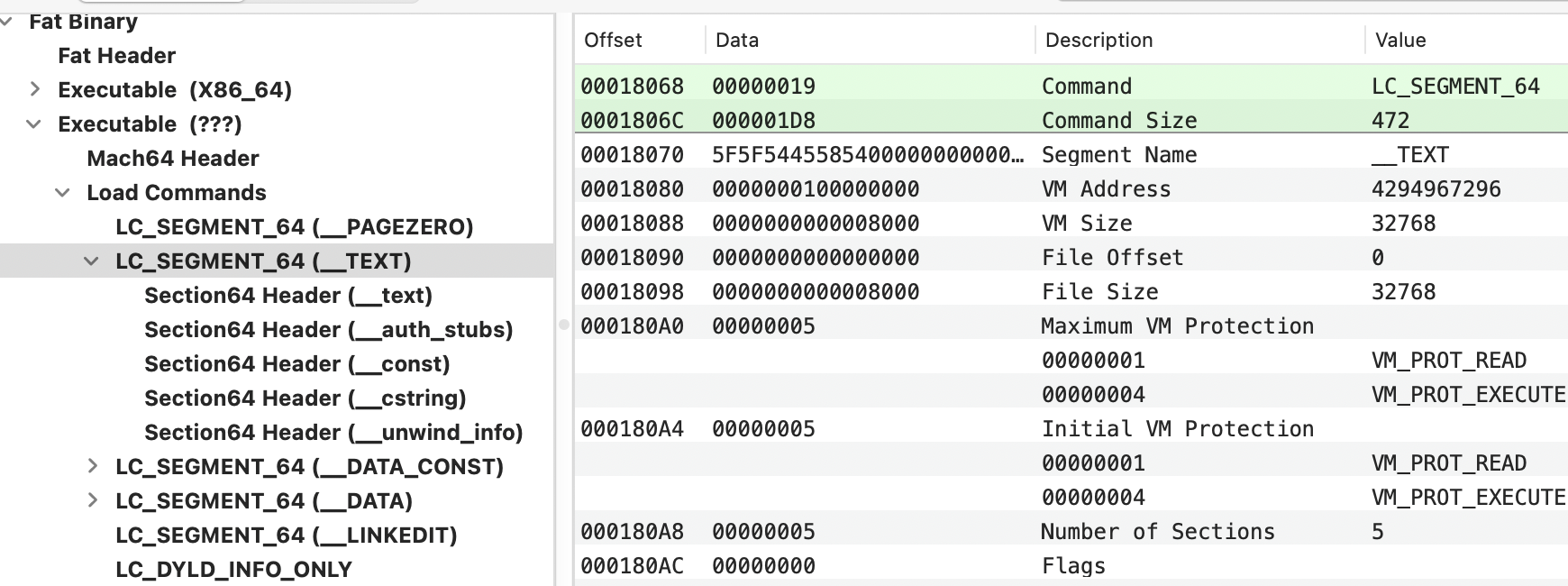
This header defines the number of sections whose headers appear after it:
struct section_64 { /* for 64-bit architectures */
char sectname[16]; /* name of this section */
char segname[16]; /* segment this section goes in */
uint64_t addr; /* memory address of this section */
uint64_t size; /* size in bytes of this section */
uint32_t offset; /* file offset of this section */
uint32_t align; /* section alignment (power of 2) */
uint32_t reloff; /* file offset of relocation entries */
uint32_t nreloc; /* number of relocation entries */
uint32_t flags; /* flags (section type and attributes)*/
uint32_t reserved1; /* reserved (for offset or index) */
uint32_t reserved2; /* reserved (for count or sizeof) */
uint32_t reserved3; /* reserved */
};
Example of section header:
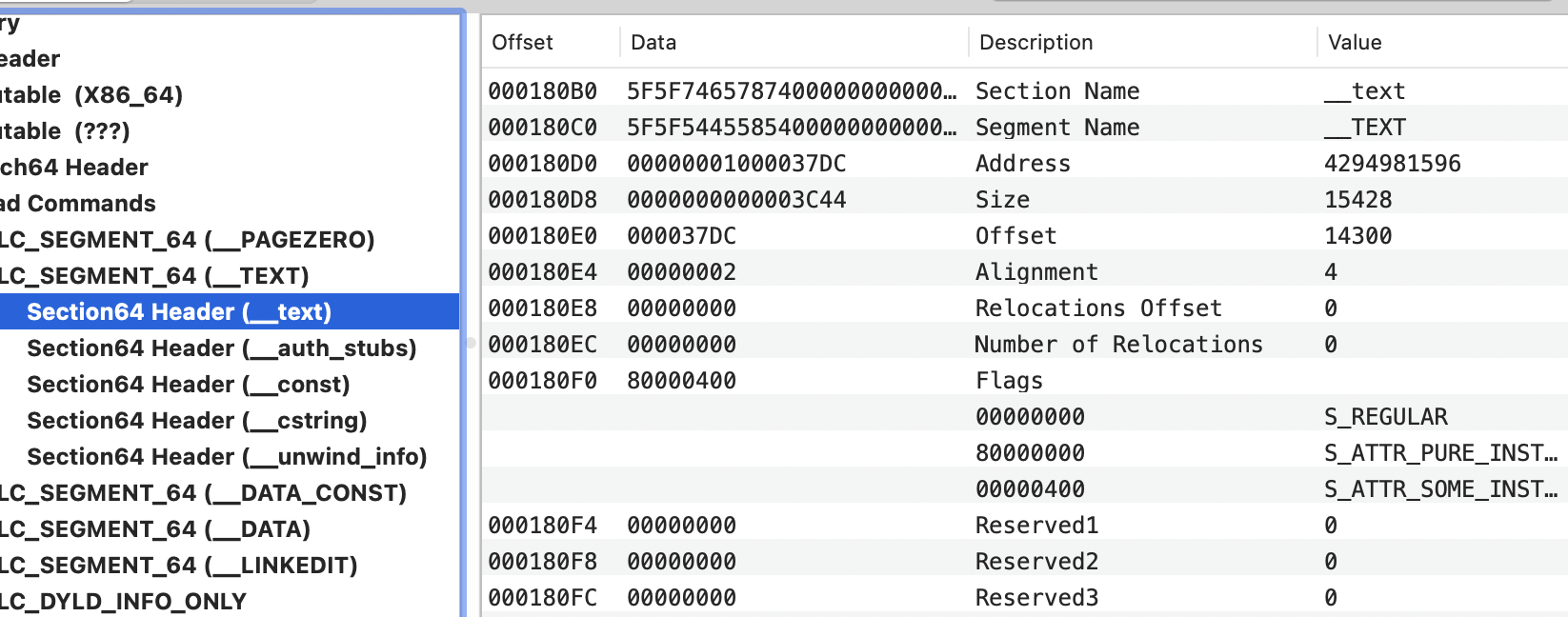
If you add the section offset (0x37DC) + the offset where the arch starts, in this case 0x18000 --> 0x37DC + 0x18000 = 0x1B7DC

It's also possible to get headers information from the command line with:
Common segments loaded by this cmd:
__PAGEZERO: It instructs the kernel to map the address zero so it cannot be read from, written to, or executed. The maxprot and minprot variables in the structure are set to zero to indicate there are no read-write-execute rights on this page.- This allocation is important to mitigate NULL pointer dereference vulnerabilities. This is because XNU enforces a hard page zero that ensures the first page (only the first) of memory is innaccesible (except in i386). A binary could fulfil this requirements by crafting a small __PAGEZERO (using the
-pagezero_size) to cover the first 4k and having the rest of 32bit memory accessible in both user and kernel mode. __TEXT: Contains executable code with read and execute permissions (no writable). Common sections of this segment:__text: Compiled binary code__const: Constant data (read only)__[c/u/os_log]string: C, Unicode or os logs string constants__stubsand__stubs_helper: Involved during the dynamic library loading process__unwind_info: Stack unwind data.- Note that all this content is signed but also marked as executable (creating more options for exploitation of sections that doesn't necessarily need this privilege, like string dedicated sections).
__DATA: Contains data that is readable and writable (no executable).__got:Global Offset Table__nl_symbol_ptr: Non lazy (bind at load) symbol pointer__la_symbol_ptr: Lazy (bind on use) symbol pointer__const: Should be read-only data (not really)__cfstring: CoreFoundation strings__data: Global variables (that have been initialized)__bss: Static variables (that have not been initialized)__objc_*(__objc_classlist, __objc_protolist, etc): Information used by the Objective-C runtime__DATA_CONST: __DATA.__const is not guaranteed to be constant (write permissions), nor are other pointers and the GOT. This section makes__const, some initializers and the GOT table (once resolved) read only usingmprotect.__LINKEDIT: Contains information for the linker (dyld) such as, symbol, string, and relocation table entries. It' a generic container for contents that are neither in__TEXTor__DATAand its content is decribed in other load commands.- dyld information: Rebase, Non-lazy/lazy/weak binding opcodes and export info
- Functions starts: Table of start addresses of functions
- Data In Code: Data islands in __text
- SYmbol Table: Symbols in binary
- Indirect Symbol Table: Pointer/stub symbols
- String Table
- Code Signature
__OBJC: Contains information used by the Objective-C runtime. Though this information might also be found in the __DATA segment, within various in __objc_* sections.__RESTRICT: A segment without content with a single section called__restrict(also empty) that ensures that when running the binary, it will ignore DYLD environmental variables.
As it was possible to see in the code, segments also support flags (although they aren't used very much):
SG_HIGHVM: Core only (not used)SG_FVMLIB: Not usedSG_NORELOC: Segment has no relocationSG_PROTECTED_VERSION_1: Encryption. Used for example by Finder to encrypt text__TEXTsegment.
LC_UNIXTHREAD/LC_MAIN
LC_MAIN contains the entrypoint in the entryoff attribute. At load time, dyld simply adds this value to the (in-memory) base of the binary, then jumps to this instruction to start execution of the binary’s code.
LC_UNIXTHREAD contains the values the register must have when starting the main thread. This was already deprecated but dyld still uses it. It's possible to see the vlaues of the registers set by this with:
otool -l /usr/lib/dyld
[...]
Load command 13
cmd LC_UNIXTHREAD
cmdsize 288
flavor ARM_THREAD_STATE64
count ARM_THREAD_STATE64_COUNT
x0 0x0000000000000000 x1 0x0000000000000000 x2 0x0000000000000000
x3 0x0000000000000000 x4 0x0000000000000000 x5 0x0000000000000000
x6 0x0000000000000000 x7 0x0000000000000000 x8 0x0000000000000000
x9 0x0000000000000000 x10 0x0000000000000000 x11 0x0000000000000000
x12 0x0000000000000000 x13 0x0000000000000000 x14 0x0000000000000000
x15 0x0000000000000000 x16 0x0000000000000000 x17 0x0000000000000000
x18 0x0000000000000000 x19 0x0000000000000000 x20 0x0000000000000000
x21 0x0000000000000000 x22 0x0000000000000000 x23 0x0000000000000000
x24 0x0000000000000000 x25 0x0000000000000000 x26 0x0000000000000000
x27 0x0000000000000000 x28 0x0000000000000000 fp 0x0000000000000000
lr 0x0000000000000000 sp 0x0000000000000000 pc 0x0000000000004b70
cpsr 0x00000000
[...]
LC_CODE_SIGNATURE
Contains information about the code signature of the Macho-O file. It only contains an offset that points to the signature blob. This is typically at the very end of the file.\ However, you can find some information about this section in this blog post and this gists.
LC_ENCRYPTION_INFO[_64]
Support for binary encryption. However, of course, if an attacker manages to compromise the process, he will be able to dump the memory unencrypted.
LC_LOAD_DYLINKER
Contains the path to the dynamic linker executable that maps shared libraries into the process address space. The value is always set to /usr/lib/dyld. It’s important to note that in macOS, dylib mapping happens in user mode, not in kernel mode.
LC_IDENT
Obsolete but when configured to geenrate dumps on panic, a Mach-O core dump is created and the kernel version is set in the LC_IDENT command.
LC_UUID
Random UUID. It's useful for anything directly but XNU caches it with the rest of the process info. It can be used in crash reports.
LC_DYLD_ENVIRONMENT
Allows to indicate environment variables to the dyld beforenthe process is executed. This can be vary dangerous as it can allow to execute arbitrary code inside the process so this load command is only used in dyld build with #define SUPPORT_LC_DYLD_ENVIRONMENT and further restricts processing only to variables of the form DYLD_..._PATH specifying load paths.
LC_LOAD_DYLIB
This load command describes a dynamic library dependency which instructs the loader (dyld) to load and link said library. There is a LC_LOAD_DYLIB load command for each library that the Mach-O binary requires.
- This load command is a structure of type
dylib_command(which contains a struct dylib, describing the actual dependent dynamic library):
struct dylib_command {
uint32_t cmd; /* LC_LOAD_{,WEAK_}DYLIB */
uint32_t cmdsize; /* includes pathname string */
struct dylib dylib; /* the library identification */
};
struct dylib {
union lc_str name; /* library's path name */
uint32_t timestamp; /* library's build time stamp */
uint32_t current_version; /* library's current version number */
uint32_t compatibility_version; /* library's compatibility vers number*/
};

You could also get this info from the cli with:
otool -L /bin/ls
/bin/ls:
/usr/lib/libutil.dylib (compatibility version 1.0.0, current version 1.0.0)
/usr/lib/libncurses.5.4.dylib (compatibility version 5.4.0, current version 5.4.0)
/usr/lib/libSystem.B.dylib (compatibility version 1.0.0, current version 1319.0.0)
Some potential malware related libraries are:
- DiskArbitration: Monitoring USB drives
- AVFoundation: Capture audio and video
- CoreWLAN: Wifi scans.
[!NOTE] A Mach-O binary can contain one or more constructors, that will be executed before the address specified in LC_MAIN.\ The offsets of any constructors are held in the __mod_init_func section of the __DATA_CONST segment.
Mach-O Data
At the core of the file lies the data region, which is composed of several segments as defined in the load-commands region. A variety of data sections can be housed within each segment, with each section holding code or data specific to a type.
[!TIP] The data is basically the part containing all the information that is loaded by the load commands LC_SEGMENTS_64
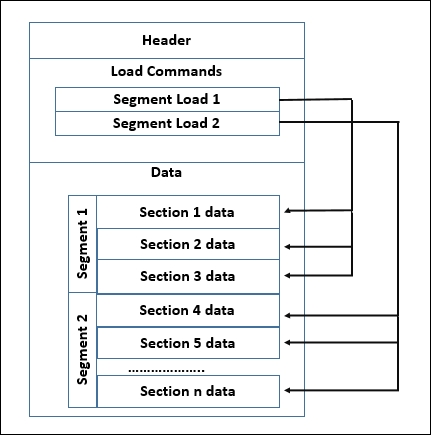
This includes:
- Function table: Which holds information about the program functions.
- Symbol table: Which contains information about the external function used by the binary
- It could also contain internal function, variable names as well and more.
To check it you could use the Mach-O View tool:
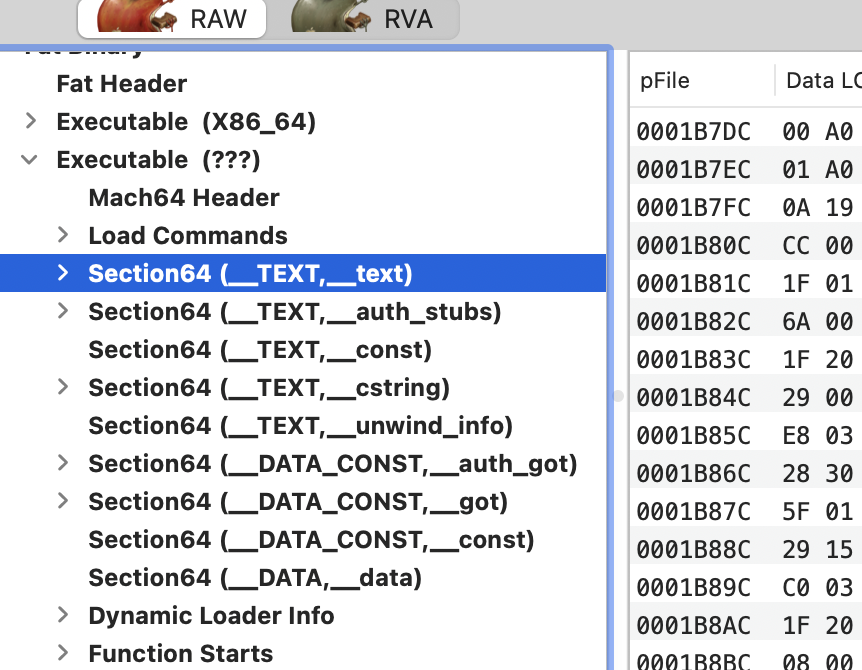
Or from the cli:
Objetive-C Common Sections
In __TEXT segment (r-x):
__objc_classname: Class names (strings)__objc_methname: Method names (strings)__objc_methtype: Method types (strings)
In __DATA segment (rw-):
__objc_classlist: Pointers to all Objetive-C classes__objc_nlclslist: Pointers to Non-Lazy Objective-C classes__objc_catlist: Pointer to Categories__objc_nlcatlist: Pointer to Non-Lazy Categories__objc_protolist: Protocols list__objc_const: Constant data__objc_imageinfo,__objc_selrefs,objc__protorefs...
Swift
_swift_typeref,_swift3_capture,_swift3_assocty,_swift3_types, _swift3_proto,_swift3_fieldmd,_swift3_builtin,_swift3_reflstr
[AD REMOVED]